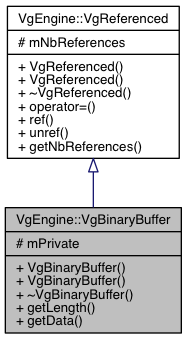|
VisioMove SDK (iOS)
2.1.22
|
|
VisioMove SDK (iOS)
2.1.22
|

Public Member Functions | |
| VgBinaryBuffer () | |
| VgBinaryBuffer (char *pData, UInt pLength, bool pVgBinaryBufferDoesDelete=true) | |
| virtual | ~VgBinaryBuffer () |
| virtual UInt | getLength () const |
| virtual const char * | getData () const |
 Public Member Functions inherited from VgEngine::VgReferenced Public Member Functions inherited from VgEngine::VgReferenced | |
| VgReferenced () | |
| VgReferenced (const VgReferenced &pThis) | |
| virtual | ~VgReferenced () |
| VgReferenced & | operator= (const VgReferenced &pThis) |
| void | ref () const |
| int | unref () const |
| int | getNbReferences () const |
Protected Attributes | |
| Private * | mPrivate |
 Protected Attributes inherited from VgEngine::VgReferenced Protected Attributes inherited from VgEngine::VgReferenced | |
| int | mNbReferences |
Friends | |
| class | VgObjectBridge |
The VgBinaryBuffer class is used to manipulate binary data.
A VgBinaryBuffer inherits from VgReferenced, so if it's correctly used (see documentation of VgRefPtr) it will be automatically deleted when it's no longer referenced (except if pVgBinaryBufferDoesDelete is false at its creation, as should be the case for static buffers).
| VgEngine::VgBinaryBuffer::VgBinaryBuffer | ( | ) |
Constructor.
| VgEngine::VgBinaryBuffer::VgBinaryBuffer | ( | char * | pData, |
| UInt | pLength, | ||
| bool | pVgBinaryBufferDoesDelete = true |
||
| ) |
Constructor.
| pData | The buffer (must be allocated using new [] because it will be deleted using delete [], except if pData is a static data, in this case be careful to use the pVgBinaryBufferDoesDelete flag). |
| pLength | The buffer length in bytes. |
| pVgBinaryBufferDoesDelete | This flag indicates whether the buffer will delete the data when it's no longer used (default is true). |
|
virtual |
Destructor.
|
virtual |
Retrieves the buffer's data (const version).
|
virtual |
Retrieves the buffer length.
|
friend |
|
protected |
Private data for this buffer.